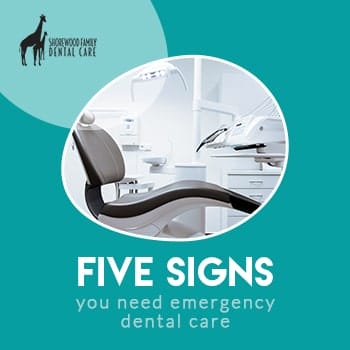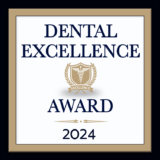
The third week of May is dedicated to recognizing healthcare professionals who provide emergency medical services (EMS). Their in-depth knowledge and quick response can make the difference between someone receiving immediate care or suffering long-term, and even life-threatening, conditions.
For most, the image of an ambulance rushing to the scene may be your first thought when you think about EMS. However, we also want to recognize dental professionals for their important contributions to handling and treating different types of dental emergency services.
We know from our patients that determining if what they are experiencing is a dental emergency can be difficult. Is that toothache something that can be treated with over-the-counter (OTC) pain medications or does it require professional attention?
Common Types of Dental Emergencies
Here are 5 types of dental emergencies and the signs that you are in need of dental care. For additional tips, take a look at our previous post on what to do during a dental emergency.
- A chipped or cracked tooth can be very painful. It’s a good idea to seek emergency care to limit further damage.
- Sudden trauma from sports or accidental contact can result in lost teeth. Shorewood Dental recommends only
- Holding the tooth by the crown.
- Rinsing is under cool water.
- Then storing in a glass of milk or the inside of your cheek to preserve it.
- Then seek immediate care from a dentist.
- Pain that doesn’t subside can have many causes and can show up in any part of the mouth such as teeth, gums, tongue and jaw.
- Swelling and severe pain around wisdom teeth might be a condition called pericoronitis. The dentist may assess for an infection and prescribe immediate treatment to prevent the spread to other areas of the body.
- A persistent bad taste in your mouth can be a symptom of a dental abscess that is the buildup of pus inside your teeth or gums. When accompanied by pain and/fever, immediate care is advised to diagnose the severity of the condition.
Good Oral Care
Daily brushing and flossing and regular visits to your dentist are the first line of defense against problems with your teeth and gums. Even with good dental hygiene habits, sometimes something just doesn’t feel right in your mouth. If you’re ever in doubt, the best bet is to call your dental office and explain what you’re experiencing and describe any possible causes of pain or discomfort.
As you family dentist near Joliet, we understand the urgency for prompt, effective treatment. Call our office immediately at (815) 725-5991 to see an emergency dentist.




